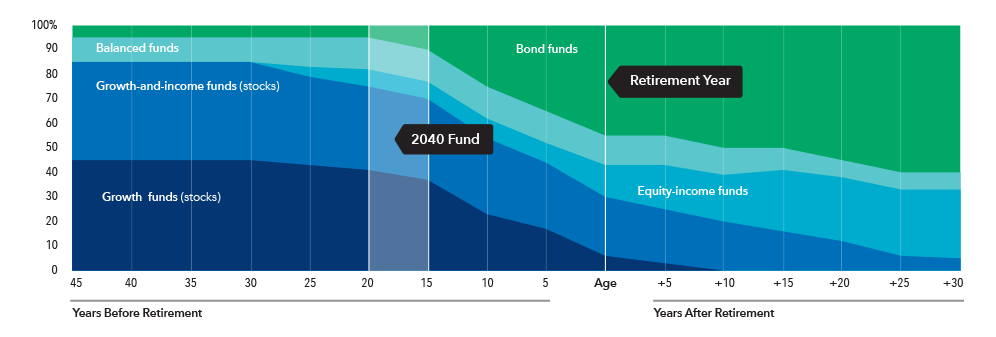

Capital Group
2040 Target Date
Retirement Trust
Set your sights on retirement and beyond.
Capital Group 2040 glide path
A glide path is a visual representation of how the investments in each of our funds change over time based on the target retirement date. Depending on the proximity to its target date, the fund will seek to achieve the following objectives to varying degrees: growth, income and conservation of capital. Learn more about the benefits of our glide path.

Target allocations are as of December 31, 2023, and are subject to the oversight committee’s discretion. Over the course of the year, the investment will be implementing changes such as increasing exposure to New World Fund, decreasing American Funds Global Balanced Fund and adding an allocation to American Funds Emerging Markets Bond Fund. For current allocations to the underlying investments as of March 31, 2024, visit capitalgroup.com. New target allocations are expected to be reached by December 31, 2024. The investment adviser anticipates assets will be invested within a range that deviates no more than 10% above or below the allocations shown in the characteristics statement. Underlying funds may be added or removed during the year.
Target allocation*
The following identifies allocation by investment objective. The asset mix seeks to balance risk and return over time by diversifying investments across asset types such as stocks and bonds. Stocks have the highest long-term return potential while bonds can help manage the risk of market declines.

 Growth
Growth
38%
 Growth-and-income
Growth-and-income
33%
 Equity-income
Equity-income
7%
 Balanced
Balanced
12%
 Bond
Bond
10%
As of 3/31/2024
Although the target date portfolios are managed for investors on a projected retirement date time frame, the allocation strategy does not guarantee that investors' retirement goals will be met. Investment professionals manage the portfolio, moving it from a more growth-oriented strategy to a more income-oriented focus as the target date gets closer. The target date is the year that corresponds roughly to the year in which an investor is assumed to retire and begin taking withdrawals. Investment professionals continue to manage each portfolio for approximately 30 years after it reaches its target date.
* The total target allocations may not reconcile to 100% due to rounding.
One fund. Many benefits. (Brochure)
Why target date funds can be a good choice
(2:31)
See how target date funds work and why they may be the right choice for you.
![]() For fund results or for information about your retirement plan, talk with your plan provider or employer, or visit your plan’s website.
For fund results or for information about your retirement plan, talk with your plan provider or employer, or visit your plan’s website.
